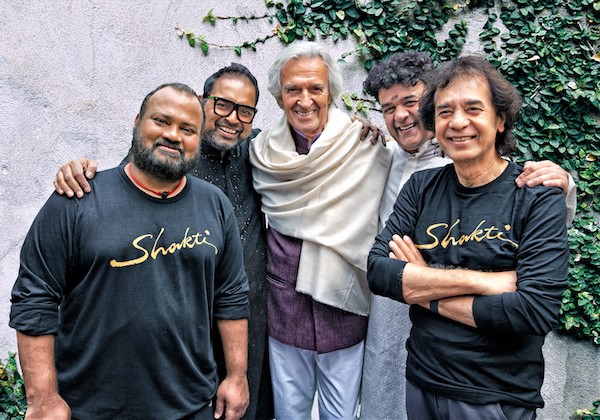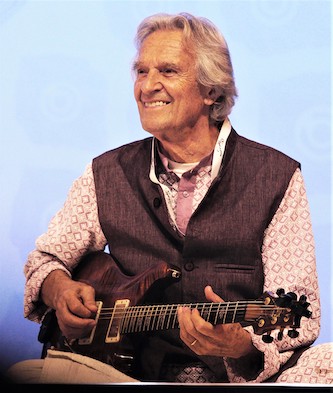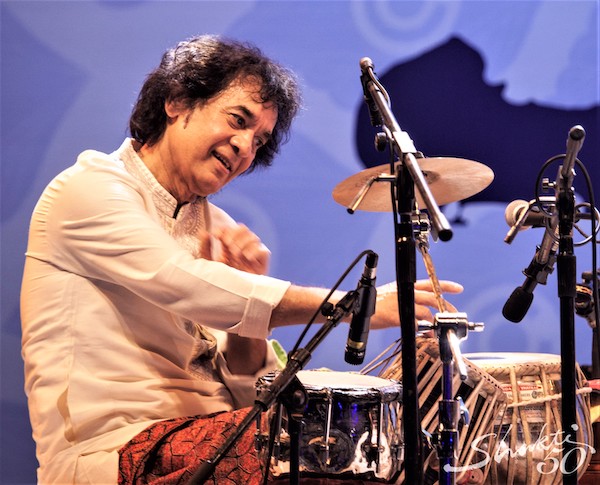Music Preview: John McLaughlin on Shakti’s 50th-Anniversary Tour
By Paul Robicheau
John McLaughlin says that even if audiences haven’t heard Indian music before, they are catching on. “They feel what we feel,” the guitarist says. “We’re all walking the tightrope, and audiences follow.”

Shakti (L-R): Selvagenesh Vinayakram, Shankar Mahadevan, John McLaughlin, Ganesh Rajagopalan, and Zakir Hussain. Photo: Pepe Gomes
Fans of jazz-fusion guitar pioneer John McLaughlin had added impetus to witness his last Boston show in 2017. Not only was he playing classics from his fiery early-1970s electric vehicle the Mahavishnu Orchestra, but it was billed as his final tour.
Well, fans are getting another shot after all. McLaughlin begins another US tour on August 17 at Boston’s Boch Wang Theatre. Only this time, the English guitarist will appear in a reunion of Shakti, the groundbreaking world-fusion group he founded in the mid-’70s with tabla maestro Zakir Hussain and other Indian musicians.
“I had planned to quit touring in a way, because touring has become really stressful,” McLaughlin says from his home in Monaco, citing flight delays and airline disrespect to musicians. “But here we go, once more into the breach.”
He notes the recent loss of friends Jeff Beck and former Miles Davis band mate Wayne Shorter. “You get to a certain age, and you don’t know what’s going to happen,” says McLaughlin, 81. “If it’s farewell, we say farewell with a lot of joy.”

John McLaughlin. Photo: Pepe Gomes
The tour celebrates Shakti’s 50th anniversary behind the release of This Moment, the group’s first studio album since 1977 (not counting a live record from related outfit Remember Shakti in 2000). Recorded over a four-year span in Monaco, India, and Washington State, This Moment finds McLaughlin and Hussain, 72, in fine form, joined by violinist Ganesh Rajagopalan, vocalist Shankar Mahadevan, and percussionist Selvaganesh Vinayakram, whose father played that role in the original Shakti.
“They are fascinated by harmony, which is my world,” McLaughlin says. “They don’t have to change the raga that they’re playing, but they hear a kind of transposed harmony behind it that gives it a completely different color.”
Another reason McLaughlin mulled retirement — bad arthritis in his right wrist — no longer poses an issue, he says, crediting mindfulness exercises promoted by American doctor Joe Dispenza. “I actually healed myself through meditation,” he says. “I have no pain. I have no swelling. Musically, I’ve never been better.”
McLaughlin played an acoustic harp guitar with crossing drone strings in the original Shakti, but he’s focusing on his electric as well as guitar synthesizer in the revived group. His old Shakti guitar was badly damaged when he loaned it to someone, McLaughlin says, and he doesn’t want to provoke a return of arthritis through positioning his right hand differently to play the acoustic guitar.
His electric guitar strikes a somewhat different tone on This Moment, particularly in “Shrini’s Dream” (an homage to the late Remember Shakti mandolinist U. Shrinivas laced by chords that evoke Led Zeppelin’s “Kashmir”) and orchestral cushioning from guitar synthesizer. But despite its polished, modern production, the album still resembles the original Shakti in McLaughlin’s nimble guitar lines (if not as rawly accelerating as in the old days), the barreling percussive undertow of Hussain and Vinayakram, and a return to violin with new virtuosic foil Rajagopalan, who projects a more mournful timbre than ’70s member L. Shankar.
“They’re kicking my butt every night, but that’s exactly what I want,” McLaughlin says, noting compositions from the new album have already been transformed during recent tours of India and Europe, alongside a couple of Shakti chestnuts.
“We’re essentially a live band,” the guitarist says. “The spontaneity that happens, the improvisation and the orchestrations, some of which are extremely complex, they evolve. There are surprises every night.”

Zakir Hussain. Photo: Pepe Gomes
Fans of Shakti’s spirited instrumental flights in the ’70s might be surprised by the increased prominence of vocals, not only in the South Indian spoken percussion exchanges known as konokol but in the central role of singer Mahadevan, a Bollywood star who’s sold millions of records. “Some people have told me — friends of mine — they have trouble listening to the Indian singers and I said, ‘Well, you have to try harder,’” McLaughlin says. “Once you really hear what they’re doing. It’s amazing.”
He drew similar reactions from his manager, agent, and record company when he phased out Mahavishnu for Shakti in the ’70s. “It was a question of existential priority,” says McLaughlin, who had met Hussain a few years earlier. “I said, ‘I have to do this. I’m ready to assume the consequences,’ which I knew was less in sales because we were selling hundreds of thousands of records — that was another era, wasn’t it?! I said, ‘I’m sorry, you’re going to have to assume the consequences also.’ But here we are 50 years later, and we’re still alive and ticking as Shakti.”
Current audiences are catching on, McLaughlin says, even if they haven’t heard Indian music before. “They feel what we feel,” he says. “We’re all walking the tightrope, and audiences follow.” If people wonder why this Western guitarist is working with Eastern musicians, McLaughlin says, “I’m not the only one. I mean, look, I go back to the ’60s and ’70s with George Harrison in his studies with Ravi Shankar and introducing the sitar.… Especially in today’s world, where there’s so much division and so much, ah, stupidity, we all need these cultural bridges.”
Paul Robicheau served more than 20 years as contributing editor for music at the Improper Bostonian in addition to writing and photography for the Boston Globe, Rolling Stone, and many other publications. He was also the founding arts editor of Boston Metro.
Tagged: Ganesh Rajagopalan, John McLaughlin, Selvaganesh Vinayakram, Shakti, This Moment, world fusion
